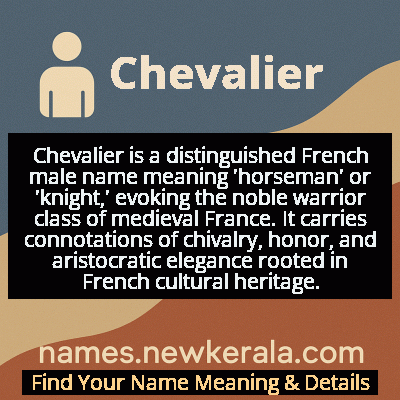Chevalier Name Meaning & Details
Origin, Popularity, Numerology Analysis & Name Meaning of Chevalier
Discover the origin, meaning, and cultural significance of the name CHEVALIER. Delve into its historical roots and explore the lasting impact it has had on communities and traditions.
Name
Chevalier
Gender
Male
Origin
French
Lucky Number
2
Meaning of the Name - Chevalier
Chevalier is a distinguished French male name meaning 'horseman' or 'knight,' evoking the noble warrior class of medieval France. It carries connotations of chivalry, honor, and aristocratic elegance rooted in French cultural heritage.
Chevalier - Complete Numerology Analysis
Your Numerology Number
Based on Pythagorean Numerology System
Ruling Planet
Moon
Positive Nature
Diplomatic, friendly, artistic, empathetic.
Negative Traits
Over-sensitive, moody, indecisive, prone to self-pity.
Lucky Colours
Green, cream, white.
Lucky Days
Monday.
Lucky Stones
Pearl, moonstone.
Harmony Numbers
1, 3, 4.
Best Suited Professions
Diplomats, mediators, caregivers, artists.
What People Like About You
Cooperative spirit, friendliness, artistic talent.
Famous People Named Chevalier
Maurice Chevalier
Actor and Singer
Iconic French entertainer who brought Parisian charm to international audiences through film and music
Chevalier de Saint-Georges
Composer and Violinist
Groundbreaking classical composer of African descent and celebrated musical virtuoso in 18th century France
Chevalier d'Éon
Diplomat and Spy
Legendary French spy who lived as both genders and became a cultural icon for gender fluidity
Alain Chevalier
Business Executive
Architect of the LVMH luxury empire and transformative leader in the global luxury goods industry
Name Variations & International Equivalents
Click on blue names to explore their detailed meanings. Gray names with will be available soon.
Cultural & Historical Significance
The cultural impact extends beyond medieval times into modern French consciousness. The name evokes images of the Three Musketeers, Joan of Arc's companions, and the elegant courtiers of Versailles. In contemporary France, 'Chevalier' maintains its aristocratic connotations while also representing artistic and intellectual achievement, particularly through figures like Maurice Chevalier who brought French charm to global audiences. The name continues to symbolize French cultural excellence, romanticism, and a certain je ne sais quoi that defines French sophistication worldwide.
Furthermore, the name represents France's contribution to Western concepts of honor and gentlemanly conduct. The chevalier ideal influenced European notions of romance, diplomacy, and personal integrity. Even today, the name carries echoes of France's cultural leadership in arts, philosophy, and social refinement, making it more than just a name but a symbol of French civilization's enduring legacy.
Extended Personality Analysis
Individuals named Chevalier are often perceived as possessing noble characteristics—chivalrous, dignified, and principled. They tend to exhibit natural leadership qualities combined with a strong sense of honor and responsibility toward others. Their personality often reflects the historical knightly virtues: courage in facing challenges, loyalty to their principles and loved ones, and a protective instinct toward those in need. There's typically an air of sophistication and old-world charm about them, making them naturally charismatic and respected in social situations.
Beyond the surface nobility, Chevaliers often demonstrate intellectual depth and artistic sensitivity. They may possess a romantic outlook on life, appreciating beauty in various forms while maintaining practical wisdom. Their communication style tends to be elegant yet direct, and they often serve as mediators in conflicts due to their fair-minded nature. While they can be traditional in their values, they typically balance this with adaptability and forward-thinking perspectives. The name suggests someone who carries themselves with quiet confidence rather than arrogance, embodying the ideal of 'noblesse oblige'—the concept that nobility extends beyond privilege to include responsibility and ethical conduct.
In relationships, Chevaliers are typically devoted partners and loyal friends who value deep, meaningful connections over superficial interactions. They often have a strong moral compass and may be drawn to careers or causes that allow them to serve others or uphold important principles. Their combination of strength and sensitivity makes them both respected leaders and compassionate companions, capable of inspiring others through both their actions and their character.
Modern Usage & Popularity
In contemporary naming practices, Chevalier maintains a distinctive presence as a choice that combines historical depth with aristocratic elegance. While it remains relatively uncommon compared to mainstream French names, it enjoys steady usage particularly among families with noble heritage or those seeking names with strong cultural and historical significance. The name has experienced a modest resurgence in recent years as part of the broader trend toward vintage and meaningful names, appealing to parents who value tradition and sophistication. Outside French-speaking regions, Chevalier is occasionally adopted by cosmopolitan families internationally, often by those with French connections or an appreciation for European aristocracy. Its usage patterns show it's favored by educated, culturally-aware parents who seek a name that conveys refinement, heritage, and distinctive character without being overly common or trendy.
Symbolic & Spiritual Meanings
Symbolically, Chevalier represents the eternal human ideals of chivalry, honor, and noble service. It embodies the archetype of the spiritual warrior—someone who battles not for conquest but for justice, protection, and higher principles. The name carries profound metaphors of guidance (the knight leading others toward truth), stability (the steadfast guardian), and moral elevation (rising above base instincts). In psychological terms, it symbolizes the integration of masculine strength with compassionate wisdom, representing the balanced individual who wields power responsibly. The chevalier archetype speaks to the universal human journey toward self-mastery and ethical living, reminding us that true nobility emerges from character and action rather than birthright. It serves as an enduring symbol of humanity's highest aspirations—the courage to face challenges, the integrity to choose right over easy, and the commitment to serve something greater than oneself.

